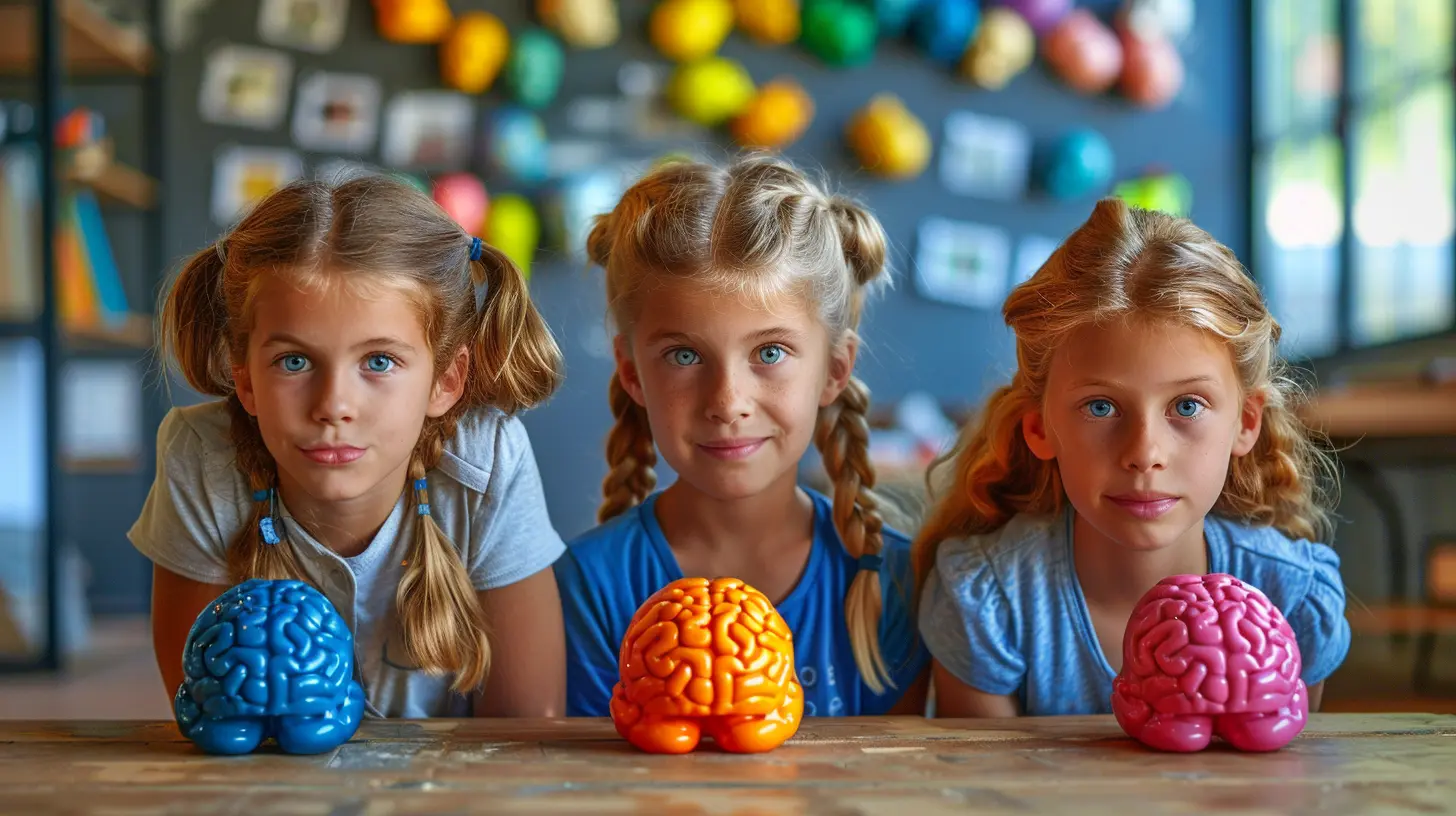The Influence of Birth Order on Cognitive Development
18 June 2025
Ever wonder why your oldest sibling seems like the overachiever, the middle one is easygoing, and the youngest gets away with everything? You're not alone. Family dynamics are fascinating, and birth order plays a bigger role than most of us realize. When it comes to cognitive development – that’s your brain’s ability to learn, think, and solve problems – being born first, second, or last can shape you more than you might think.
Let’s dive into the birth order debate and see how your place in the family lineup could be wired into your intellect.
What Is Cognitive Development, Anyway?
Before we get lost in the birth order rabbit hole, let’s get clear on what cognitive development actually means.In simple terms, cognitive development refers to how we think, learn, remember things, and solve puzzles from the time we’re babies to adults. It’s like your mental muscle — constantly growing and changing based on experiences, environment, and yes… even family structure.
Birth Order 101: Firstborns, Middles, and Last-Borns
You’ve probably heard some version of this:- Firstborns are responsible and smart.
- Middle children are peacemakers.
- Youngest kids are rebellious and charming.
While this sounds like a horoscope for siblings, there’s actual research behind it. Psychologists have been studying this for decades. The idea is that our parents, whether they realize it or not, treat each child differently based on when they’re born — and that changes everything, especially when it comes to how a child’s brain develops.
Firstborns: The Brainy Leaders of the Pack?
Let’s talk about the firstborns for a second. If you’re the oldest, you’ve probably been told to “set an example” more times than you can count. Guess what? That extra pressure might boost your brainpower.Why Firstborns Might Score Higher
Studies often show that firstborns tend to have slightly higher IQs than their younger siblings. We're not talking genius-level gaps — just a few points. But why?It mainly comes down to undivided attention. Firstborns get all the parental focus, especially in those early, critical years of brain development. It’s like being the only student in class with a private tutor.
Also, when younger siblings come along, older kids step into a "teacher" role. And teaching others is one of the best ways to reinforce your own learning.
Think About It:
Who read to you every night before bed before your siblings showed up? If your parents had time, it was probably you. That early one-on-one time matters — a lot.
Middle Children: The Adaptable Thinkers
Middle children have it tough in theory. They’re sandwiched between the trailblazer and the baby. But don’t count them out – when it comes to cognitive flexibility and social smarts, they’re often ahead of the game.How Middle Kids Boost Their Brainpower
Middles learn early that they won’t always be the center of attention. That might seem like a bad thing, but it forces them to adapt, negotiate, and observe more.They often become the diplomats of the family, developing strong verbal skills and emotional intelligence. These are key parts of cognition too — it’s not just about math tests.
Quick analogy:
Middle children are like Swiss Army knives – not always flashy, but quietly equipped with everything you need.Youngest Children: Creative and Clever (But in a Different Way)
The baby of the family might not get the same strict discipline as the older kids, and believe it or not, that can impact how they think, learn, and take risks.The Youngest and Out-of-the-Box Thinking
Because youngest kids grow up with older siblings around, they’re exposed to more complex language and concepts early on. They overhear things that firstborns had to learn the hard way. This can give them a bit of a shortcut in vocabulary and understanding.Also, younger kids are often more adventurous and creative. With fewer expectations weighing them down, they’re more likely to try different approaches to problems (and life). That kind of risk-taking mindset can be a goldmine for cognitive growth.
Another way to see it:
Youngest kids are like jazz musicians – they bend the rules and improvise, and sometimes create something brilliant in the process.Only Children: A Category of Their Own
Let’s not forget the only children. They’re like permanent firstborns with a twist. No competition, all the attention.How Only Children Develop Cognitively
Only kids often mature faster because they spend more time around adults. This can boost vocabulary and reading skills early on.But there's a flip side. Without siblings to wrestle with (literally and figuratively), they might not get as much practice negotiating, compromising, or navigating conflict — skills that are also essential for cognitive growth in the real world.
So while they often excel academically, only children sometimes struggle with teamwork or peer conflict when they enter larger groups like school or the workplace.
Nature vs. Nurture: It's Not All in the Order
Now, here comes the curveball.While birth order does influence cognition, it’s not the only player on the field. Genetics, parenting style, socioeconomic status, culture, and education all have massive effects too.
Two firstborns from different families can turn out completely different if their environments aren't the same.
So, Is Birth Order Destiny? Nope.
It’s more like seasoning in a dish — it adds flavor, but it doesn’t make the whole meal.The Role of Parenting Styles
Let’s talk about mom and dad for a sec. The way parents treat each child (often unintentionally) can change based on birth order.- Firstborns might get stricter rules and more structured schedules.
- Middle kids might have more freedom but less attention.
- Youngest children often get a more relaxed set of expectations.
This different treatment can absolutely shape how children learn and think.
What’s interesting is that parents usually don’t even realize they’re doing it. They're just responding to the child’s needs — or reacting to what worked (or didn’t work) with the older one.
School Performance and Intelligence: Who Has the Edge?
Research does show some patterns:- Firstborns often perform slightly better in standardized tests.
- Youngest kids are more likely to enter creative fields.
- Middles tend to be more independent thinkers and good in team settings.
But remember, the gap is usually small. Birth order doesn’t decide your fate — it just nudges you in certain directions.
Real-Life Examples That Might Ring a Bell
Let’s look at some well-known siblings:- Elon Musk is the eldest of his siblings — visionary, structured, and driven.
- Princess Diana was the third of four kids — warm, empathetic, and socially intelligent.
- Jim Carrey is the youngest — wildly creative with an unconventional path to success.
Coincidence? Maybe. But you can definitely see the patterns.
Can You Change the Cognitive Impact of Birth Order?
Absolutely. Awareness is half the battle. Parents who understand these tendencies can actively balance them. For example:- Giving middle kids special one-on-one time.
- Encouraging youngest kids to take on leadership roles.
- Letting firstborns know it’s okay not to be perfect.
And if you’re the sibling yourself? Just knowing how you might be wired gives you an edge in growing your brain in new directions.
Final Thoughts: It’s Not Just When You’re Born — It’s How You Grow
So here’s the deal: Birth order does influence cognitive development, but it’s not a life sentence. It’s more like a starting point on your cognitive roadmap.If you're a firstborn, use that structure to lead. If you're in the middle, embrace your versatility. And if you're the youngest, let your creativity fly — just remember to ground it too.
In the end, it's not about when you arrived — it’s about how you show up.
all images in this post were generated using AI tools
Category:
Cognitive DevelopmentAuthor:

Ember Forbes
Discussion
rate this article
2 comments
Ardent Phillips
Birth order whispers; minds bloom in unique ways.
November 22, 2025 at 4:35 PM

Ember Forbes
Thank you for your insightful comment! Indeed, birth order can play a fascinating role in shaping cognitive abilities and perspectives.
Greyson McConkey
Birth order shapes perspectives, yet individual experiences ultimately define growth.
June 18, 2025 at 2:41 PM

Ember Forbes
Thank you for your insightful comment! I agree that while birth order can influence perspectives, individual experiences play a crucial role in shaping growth and development.


